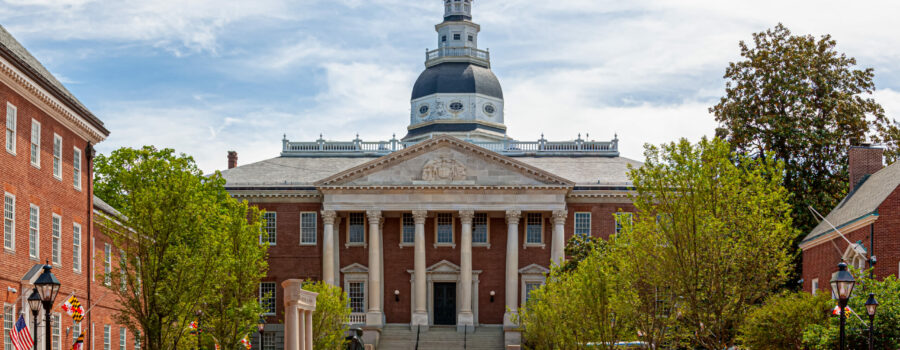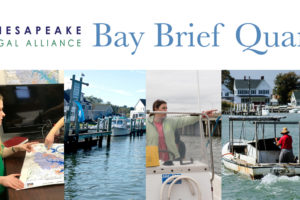Maryland Legislative Roundup 2022
By Evan Isaacson
The 2022 Maryland legislative session will be remembered as a landmark year for environmental legislation. The headline, of course, is the passage of the “Climate Solutions Now Act,” a title that adequately reflects the urgency with which the bill’s provisions try to address Maryland’s impact on climate change. Many bills are more symbolic than meaningful, and several previous climate bills in Maryland certainly fall into that category. Thankfully, this year’s climate bill (soon to be law) is not one of them.
On the Chesapeake Bay and water quality front, where CLA spends most of its time assisting partners with our legislative expertise, it was a similarly profound legislative session. Before discussing the biggest victory, it’s worth noting that there was one climate bill we were actively tracking and rooting for. Senate Bill 630 establishes a new Office of Resilience within the Maryland Department of Emergency Management. This new office will have a critical role to play in starting to build out the policy and infrastructure needed to help Maryland adapt to climate change in the coming decades at the same accelerating pace as our climatic changes.
The Chesapeake Bay Commission engaged CLA last year for legislative research assistance to understand the state of climate policy in each of the Bay Commission’s three states and where there are the biggest policy gaps that need to be filled by the individual state legislatures. Creating a new state entity that is permanently charged with identifying climate vulnerabilities and opportunities to adapt to them was the top policy recommendation for Maryland. While it is not the most ambitious climate adaptation legislative idea, it is the most important first step, paving the way for a coherent and coordinated approach to developing future resilience legislation.
With the passage of the Climate Solutions Now Act this year, it is certainly time for the Maryland General Assembly to begin focusing greater attention on climate legislation designed not only to reduce Maryland’s carbon footprint but to help protect Maryland from climate change. The Climate Resilience Officer will be charged with helping to do just that and CLA is proud to have played a small part in moving that position closer to reality.
The big victory for Maryland water quality in the shorter term, however, was the passage (and early enactment) of House Bill 649 (HB 649). As visitors to this site are aware, CLA has been celebrating the 50th anniversary of the creation of the federal Clean Water Act. We could not be more excited or proud to have helped a broad coalition of advocates pass a law that has done more to reinvigorate the role of the Clean Water Act in Maryland than any other bill in decades.
In the broadest sense, HB 649 (now “Chapter 22”) of 2022 does two things. First, it provides a truly transformative infusion of resources to the Maryland Department of the Environment (MDE). The fiscal experts at MDE and the General Assembly estimate that the bill’s implementation will result in about 100 new staff within MDE’s Water and Science Administration; an amount that, by itself, would increase that division’s workforce by a third.
Secondly, the bill goes beyond merely calling for additional resources and staff by creating performance benchmarks for two of MDE’s core functions. On the permitting side, the law requires MDE to eliminate its backlog of expired permits (now widely known as “zombie permits”) and requires MDE to keep sufficient staff to keep that backlog eliminated. On the inspection and enforcement side, the law requires that facilities in significant noncompliance with their permits receive monthly or quarterly inspections (depending on permit type), and pay automatic – and escalating – penalties if that significant noncompliance isn’t resolved.
Prior to this law, there was no requirement regarding how often to inspect a facility and some could go on for years in noncompliance without so much as a visit from the Department. As far as consequences for flagrant violations of the law, it’s pretty well established that enforcement levels have fallen off a cliff here in Maryland. Under this new law, that’s not an option anymore. Compliance with clean water laws designed to restore the Chesapeake Bay and protect public health will now be the new normal, just the way the Clean Water Act intended.
Another victory this session was the passage of a bill that was built off of a legislative win from the 2021 session. Last year, the General Assembly reacted to news that CLA helped uncover regarding a massive proposed $15 million subsidy to a private company in violation of their Clean Water Act permit by passing a bill cutting the subsidy in half and permanently capping these state grants to 50% of the overall cost of a clean water project under the relevant state fund.
The General Assembly came back this session and maintained that 50% cap, but expanded the restriction by clarifying that these grants cannot pay private companies unless they are also providing certain public services with the project funded by state money. The bill also created a number of important transparency enhancements so that the public and elected officials are kept informed about how the hundreds of millions of dollars in clean water infrastructure funds are spent each year. CLA was a proud supporter of this bill.
Finally, we are pleased that a bill requiring greater consideration of environmental justice in the state’s permitting process has passed. It is a great first step toward enshrining more protections for the state’s vulnerable populations and the prevention of future environmental injustices, the legacy of which drive many of the cases and matters we are working on as staff or place with our pro bono attorneys.
Last year, we closed the session thrilled to see our priority bill on transparency in environmental enforcement pass and become law, and in awe of the number of good environmental bills we supported, tracked, or worked on that also became law. We did not think that 2022 could compare with the unique success that was the 2021 session. We are very excited to say that we were wrong and happy to continue celebrating our clean water protections in 2022.




